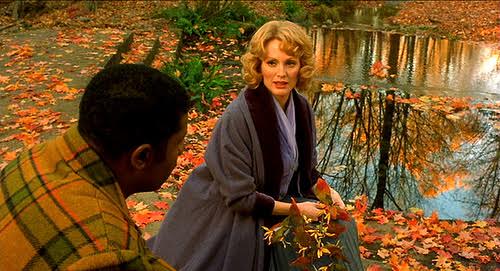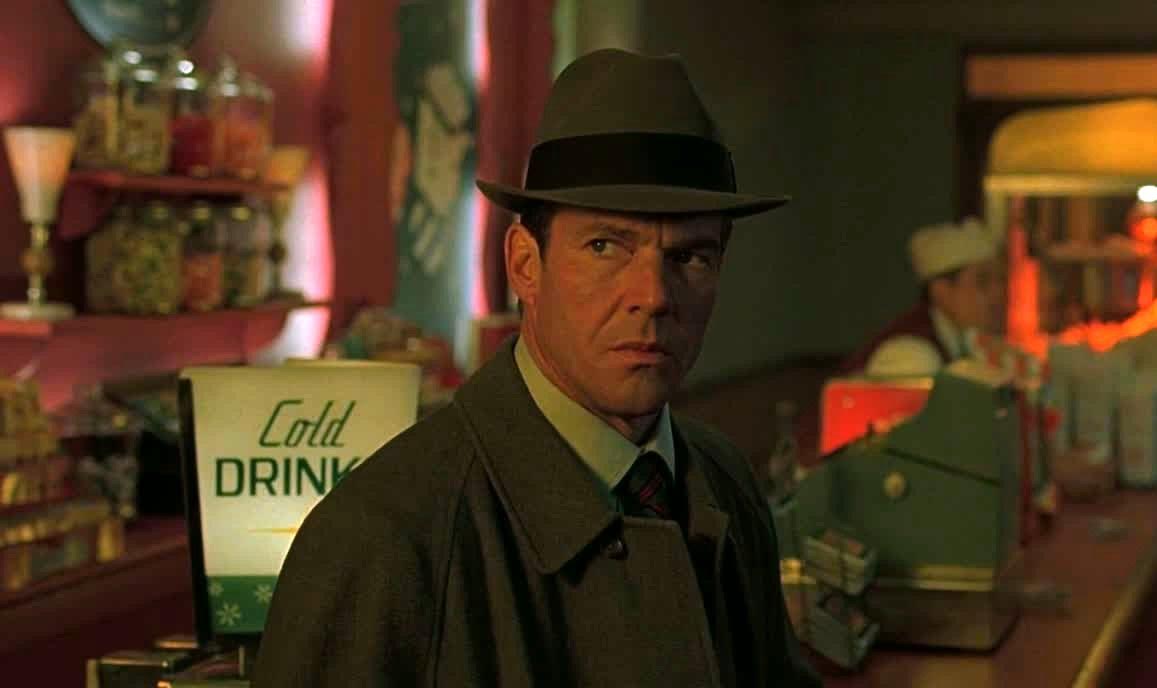by Patrick Ball

It certainly isn’t a stretch to consider any Todd Haynes filmography part of the Queer Oscar Canon. The filmmaker brought us La Blanchett in the all-timer Carol and as a gender-bent Bob Dylan in I’m Not There. He directed Laura Dern and Kate Winslet on the small screen in prestige HBO offerings Enlightened and Mildred Pierce (respectively). And I know I’m not alone in my extreme anticipation for his forthcoming May/December, his third collaboration with primary muse Julianne Moore. If the proverbial Dorothy is 'a great actress or queer icon of her generation' than the man is a *friend* of Dorothy. But my favorite, and an early example of how a queer perspective permeates through his style, enriching the work, is Far From Heaven.
Far From Heaven, a juggernaut on the 2002 Critics Circuit, eventually was nominated for four Academy Awards- including one for Haynes’ himself for Best Original Screenplay. Though it didn’t take home any trophies that night (in an intensely competitive and notorious Oscar race), Far From Heaven was considered a breakthrough for Haynes as a filmmaker...
Inspired by the films of Douglas Sirk from the 1950s, Haynes’ screenplay uses the trappings of the 1950s melodrama: stylized acting, opulent colors, social issue subject matter, and theatrical staging, and lovingly wraps them around a screenplay that considers how all of those elements transform when the story says explicitly what a film from the 1950s could only imply. It turns what may have been a handsome, but hokey, exercise in style into a masterpiece on repression, regret, and the roles we play. What queer person can’t relate in some way to that kind of journey?

Far From Heaven concerns Cathy Whittaker (Julianne Moore, luminous and heartbreaking), a Connecticut housewife with a seemingly perfect life: two adoring children, a charming and successful, if distracted, husband Frank (Dennis Quaid, wonderful and at peak Daddy), and a place at the top of Connecticut society. Over the course of a New England fall and winter Cathy builds an unexpected bond with her African-American gardener Raymond Deagan, played by Dennis Haysbert (dignity personified), as her marriage begins to crumble when she discovers Frank has been secretly seeing men.
While a 1950s melodrama might exploit the emotion that arises from these hot-button issues while tip-toeing around actually discussing them, Haynes tackles them head on. But, always in a way that feels organic to the era. The discussions are frank, but limited, using the knowledge and vocabulary of the era: modern topics, mid-century experience. The 1950s Connecticut housewife wouldn’t know how to talk about her husband’s long-gestating homosexuality, she wouldn’t know how to express the newfound freedom in her attraction to her Black gardener, but we see her and the men in her life grapple with these strange and new emotions nevertheless. Raymond, though gentle and reserved, is no ‘noble suffering Negro’ trope. When Cathy remarks that she can’t imagine how it must be for him to always be the “only one in a room”, he responds that “there is a world, even here in Hartford, where everybody does indeed look like me.” Gently reminding her, in his best Toni Morrison realness, that the white experience is not necessarily the center. And Frank, though forced to duck into shadowy bars and a life of deception to explore his queerness, is not reduced to a simple obstacle in the way of Cathy’s journey. We hear Frank talk of his lifelong struggle, we see the reality of the psychological “treatment” available to him, which amounts to a 1950s version of conversion therapy, and ultimately, in a film that is decidedly bittersweet, he is the only character really afforded a happy ending.
The primary theme of the film is repression, and the freedom one can feel when they can finally find a person, a time, a space to just talk about the thing. When we think about the chosen family that makes up so much of the queer experience, that very freedom is an essential component. What makes Far From Heaven exceptional, and inherently queer, is the subtle and profound ways the characters find that freedom, if fleeting, in intersectionality. Black, white, queer, upper class, working class, young, old: the characters are most at peace, and the veneer of the purposely stylized production most removed, when they reach across the lines that divide to find a place to connect. If the title is apt for this beautiful but melancholy film and also for our current culture, then there is some solace to be found in the final image. After Cathy leaves the train station where Raymond has just left to move to Baltimore, presumably never to be seen again, the camera pans up to a branch with flowers in bloom. Fall and winter have passed, and we’re left with seeds of hope, however small. Cathy may have a long way to go, and so may we, but by daring to say who we are out loud, maybe we get a couple steps closer to Heaven.
Far From Heaven is currently streaming on Starz and for rent across platforms.
more in our Queering the Oscars series